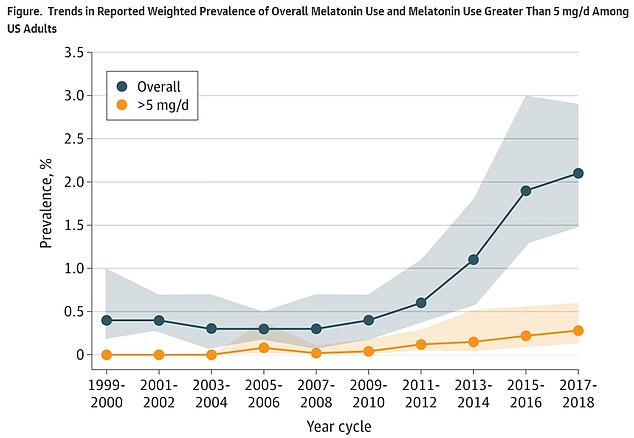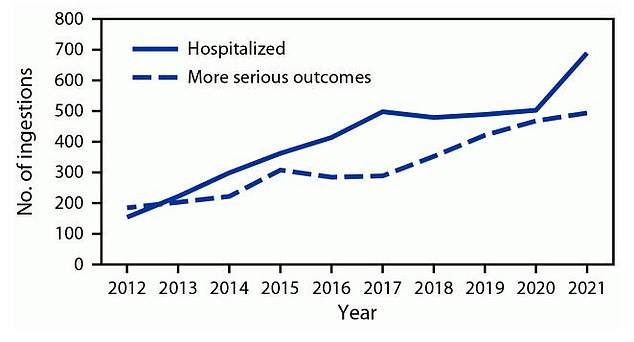Nearly HALF of parents have given their children under 13 melatonin to help them sleep – despite side effects
Nearly half of US parents give the sleep supplement melatonin to their children under the age of 13.
A poll of the American Academy of Sleep Medicine (AASM) found that 46 percent of parents have given their children under the age of 13 melatonin at least once.
Researchers have said that parents think melatonin is harmless because it is a hormone naturally produced in the body.
But the supplements are not regulated by government agencies, often contain much higher doses than the labels say, and can lead to side effects, poisoning and even dementia.
A survey by the American Academy of Sleep Medicine (AASM) shows that almost half of American parents have given their child under the age of 13 melatonin at least once.
Meanwhile, the survey also found that 30 percent of parents have given it to teens over the age of 13.
AASM conducted the survey online and distributed it to 2,005 U.S. adults between March 24 and 29, 2023. Of these, 1,003 had at least one child under the age of 18 living with them.
Fathers are more likely than mothers to give melatonin to their children and teens, and parents ages 25 to 34 are the most likely age group to give it to children under 13.
Melatonin is a hormone that determines how sleeping or awake people feel.
The hormone is produced in the pineal gland in the brain and its release into the body is controlled by light.
During the day, when the eye absorbs light, melatonin levels in the body are low and as a result we feel awake.
But when it gets dark and the amount of light absorbed by the eye decreases (although in modern societies this is disrupted by artificial lighting), more melatonin circulates through the body.
Melatonin prepares the body for sleep by slowing the heart rate, lowering blood pressure and changing the way heat is stored in the body – lowering the body’s core temperature while warming the outside of the body and extremities.
The hormone also makes people feel sleepy.
Last year, a joint research team from the Mayo Clinic and Beijing University found that the number of Americans using the drug quadrupled between 2009 and 2018.
Federal reports also showed that revenue rose from $285 million in 2016 to $821 million in 2020.

The number of Americans using melatonin quadrupled between 2009 and 2018, a survey shows, with more than 2% of respondents using the drug in 2017 or 2018.

Melatonin intake in children caused poisoning in the US between 2012 and 2021
The supplement is also ubiquitous. A bottle of 30 pills can be purchased at almost any pharmacy for as little as $10. But it may be more powerful than the labels suggest.
Earlier this year, a study found that about nine out of 10 store-bought supplements were incorrectly labeled. For example, one melatonin supplement contained 347 percent (4.5 times) as much of the hormone as stated, while another contained no melatonin at all and was instead made from CBD.
A report from the Centers for Disease Control and Prevention (CDC) found that the number of children hospitalized after taking melatonin increased 530 percent between 2012 and 2021.
Melatonin was responsible for almost five percent of all child poisoning cases in 2021, compared to 0.6 percent in 2012. It was the most commonly ingested substance among children reported to national poison control centers.
Although the vast majority of cases reported to poison control were asymptomatic, approximately 84 percent of the more serious symptoms involved the gastrointestinal, cardiovascular or central nervous systems.
An overdose of melatonin is rarely fatal, but more severe cases can cause very low blood pressure, disorientation and tremors.
Vomiting is a common side effect of melatonin poisoning, and when your child starts speaking slurred, it’s time to go to the emergency department.
There is no strong existing research on the long-term effects of melatonin. However, experts fear that there may be some negative side effects with regular use of the drug, and that it could even increase a person’s risk of developing dementia in old age, according to a study published in JAMA.
The researchers warned that Americans who “self-medicate” at high doses for long periods of time risk short-term side effects, including fatigue, dizziness, headaches, and more serious long-term health consequences, especially if taken with other medications.
They also said the spike is “a crazy situation that has gotten out of control.”
Melatonin is considered a supplement, meaning it is not regulated by the Food and Drug Administration (FDA).
“It’s a bit alarming; The fact that the product is available without a prescription does not mean that it is completely harmless and has no important physiological effects,” Dr. Naima Covassin of the Mayo Clinic College of Medicine and Science in Rochester, Minnesota, told JAMA.
